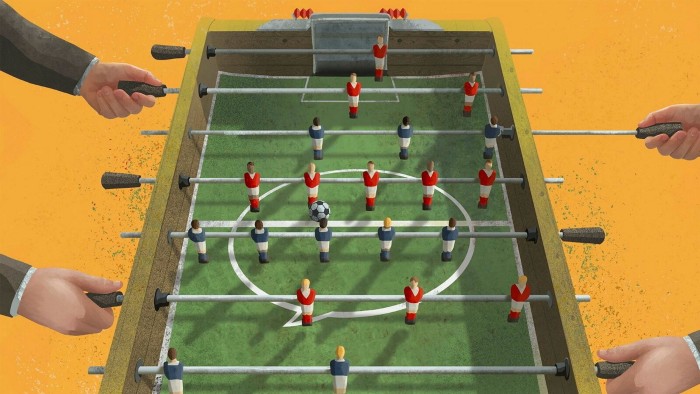Gary Lineker and free speech’s problematic new realm


Simply sign up to the Media myFT Digest -- delivered directly to your inbox.
The pursuit of impartiality can make people do mad things. A number of journalists I know abstain from voting in order to maintain it. This has always struck me as a revealingly tribal way of viewing the world: is the only critical judgment they make about politics whether to tick a red or blue box at election time? Inevitably if you raise children, look after elderly relatives, drive, use public transport, rent, have a mortgage or a portfolio of properties, you reach conclusions about whether your country is run well or badly.
Tim Davie, the BBC’s director-general, is now grappling with the fallout from his own moment of madness. Having banned Gary Lineker, the former England international, from presenting the football highlights over his intemperate tweets about Conservative rhetoric about asylum and immigration, he has now U-turned. Lineker is restored and the corporation will now have an “independent review” into its social media guidelines.
That review would do well to start by noting that ex-footballers and others who produce entertainment for the BBC have long enjoyed greater freedom than those who work in news. No one at the BBC sought to remove the sports pundit Ian Wright, or force him to retract his remarks saying that he had admired Margaret Thatcher because she was “a strong woman” like his mother, and she allowed him to keep “a lot more of the money I earned”. No one at the corporation sought to bar Lineker after he came out for Remain in 2016 or called for Labour to “bin Corbyn” in 2017. One reason why the BBC has now ended up having to cancel or curtail much of its football coverage is because the principle that ex-footballers can make political remarks outside of their broadcast roles is well-established.
As it happens, I agree with Wright that the top rate of tax when Margaret Thatcher came to power, at 83 per cent, was far too high, and with Lineker that it would have been better all round had the UK remained in the EU and Jeremy Corbyn not led the Labour party into the elections of 2017 and 2019. But I disagree with Lineker that the UK’s rhetoric on immigration sounds like that of 1930s Germany. The comparison is crass twice over: it minimises the explicit violence of Nazi rhetoric, and it ignores the far greater similarities between British rhetoric then and British rhetoric now.
But neither I nor anyone else has the right to expect that the celebrity presenting the football highlights will be aligned with them on taxation, the UK’s institutional arrangements, the Labour party leadership or the proper way to think or talk about British immigration policy when they are off air.
The BBC’s blunders in their handling of the Lineker affair echo how Disney bungled the controversy over the actor Gina Carano’s conspiracy-laden tweets. Carano was fired from her role as the mercenary Cara Dune on the Star Wars show The Mandalorian on the grounds that she did not share Disney’s “values”. But Carano was not hired for her “values” and she should not, therefore, have been dismissed as a result of them.
Bob Chapek, Disney’s then-CEO, and Davie face similar challenges: pressure from politicians that pushes them in a conservative direction, pressure from staff that moves them in a liberal one. Added to that, social media has created a new realm of speech. Lineker’s tweets are not private, obviously, but they are not corporate missives or professional remarks either.
Although Twitter is public, people follow celebrities and other figures to gain an unvarnished insight into who they are. But following people we admire in one arena on social media almost inevitably involves learning about things we disagree with them on in others. It’s reasonable for us to draw inferences about whether or not we would like to hang out with that person, or whether we would see a film based on their recommendation. But crass tweets about migration policy which reveal you badly need to read Louise London’s Whitehall and the Jews are not a reasonable metric to bar you from presenting the football.
This inevitably means that some people will face greater limitations on what they say on social media. Litigating your own organisation’s internal disputes in public is, obviously, a no-no, while it is reasonable to assume that people will have a higher tolerance for eccentric tweets from actors than they might from a medical professional.
But regardless of the exact nature of the role, the conclusion the BBC’s review should reach is the same one that politicians and CEOs ought to make: that the only reasonable expectation you have of a service is professionalism, not that their social media feeds will be free of anything you find disagreeable.
This article was updated on March 13 after Gary Lineker’s agreement with the BBC.
Comments